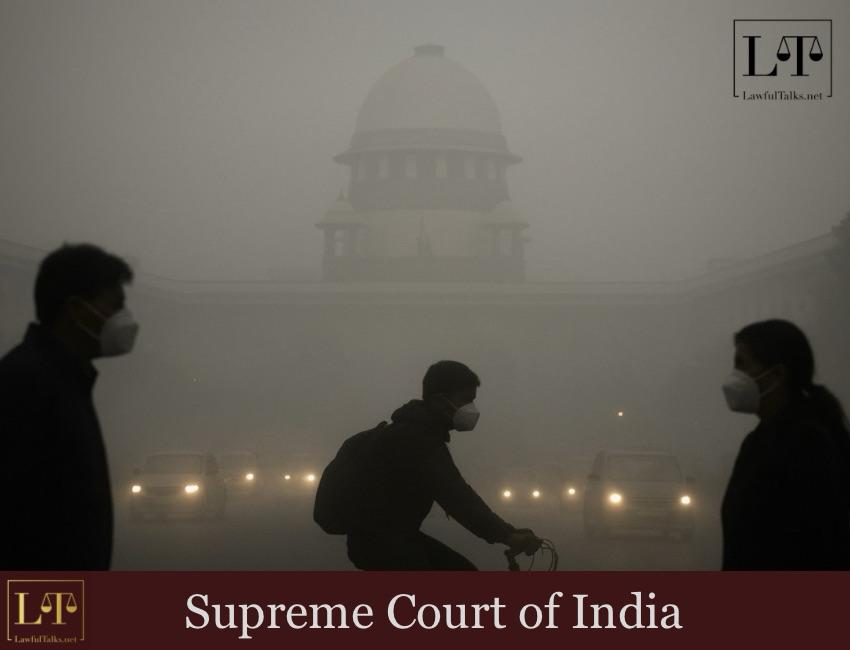Allahabad HC Sets Aside Afzal Ansari's Conviction, Allows Him to Continue as MP

Calling attention to a national public health “emergency,” wellness advocate Luke Christopher Coutinho—known for his work with the Prime Minister’s Fit India Movement—has filed a strongly argued Public Interest Litigation(PIL). The plea delivers a stark warning: every single day, over 1.4 billion Indians are left with no choice but to breathe in toxic air. It further urges to ‘’Declare Air Pollution a National Emergency”

Background:
Coutinho’s petition highlights that rising air pollution—spreading across cities and villages alike—is no longer a local issue but a widespread threat to public health. The petitioner points out that even with a “thorough policy framework” in place, much of India still faces dangerously poor air quality, which continues to worsen every year.
The petition draws specific attention to the fact that national air quality standards, as outlined under the 2009 National Ambient Air Quality Standards by the Central Pollution Control Board, fall well short of reality.
Cities like Delhi and Lucknow, for example, consistently record PM₂.₅ annual levels of around 105 μg/m³ and 90 μg/m³ respectively, dramatically eclipsing the 40 μg/m³ threshold. Kolkata fares slightly better at 33 μg/m³, but still crosses international boundaries of safety.
“In practice, annual averages in cities such as Delhi (PM₂.₅ ≈ 105 μg/m³), Kolkata (PM₂.₅ ≈ 33 μg/m³), Patna (PM₂.₅ ≈ 131 AQI equivalent), and Lucknow (PM₂.₅ ≈ 90 μg/m³) are not only far above national standards but more than 10-20 times the safe limits recommended by the WHO, thereby placing millions of residents at serious risk of respiratory, cardiovascular, and neurological harm.”
In fact, Indian standards themselves are far less stringent than the World Health Organization's 2021 guidelines, which set the PM₂.₅ ceiling at just 5 μg/m³ and similarly low levels for other particulates.
Further, the PIL argues that air quality monitoring itself is woefully inadequate, especially outside big cities. “Experts estimate that at least 4,000 stations – 2,800 in urban areas and 1,200 in rural areas – are required to capture real trends, yet NCAP has consistently fallen short of its targets. The monitoring that does exist is urban-centric, leaving rural areas, industrial belts, informal settlements, and vulnerable communities outside the purview of systematic assessment. This results in critical ‘data shadows,’ where exposure risks of the most marginalized populations remain invisible in official policy, despite being the most affected.” Coutinho argues that even well-known government policies have failed to bring real improvement on the ground.
He highlights, “The National Clean Air Programme (NCAP), launched in 2019 with the target of reducing particulate matter by 20–30 percent by 2024 (subsequently extended to 40 percent by 2026), has not met its modest objectives. As of July 2025, official data reveals that only 25 of the 130 designated cities have achieved a 40 percent reduction in PM₁₀ levels from the 2017 baseline, while 25 other cities have in fact seen an increase.”
In Delhi, the crisis is so severe that, according to medical and government data, “2.2 million schoolchildren have already suffered irreversible lung damage.” He highlights, “The National Clean Air Programme (NCAP), launched in 2019 with the target of reducing particulate matter by 20–30 percent by 2024 (subsequently extended to 40 percent by 2026), has not met its modest objectives. As of July 2025, official data reveals that only 25 of the 130 designated cities have achieved a 40 percent reduction in PM₁₀ levels from the 2017 baseline, while 25 other cities have in fact seen an increase.”
The plea also points out that leaving rural areas out of air quality monitoring is a major flaw that prevents fair and effective policymaking.
The petition claims that weak laws and poor enforcement have allowed serious violations to go unchecked. "Independent assessments of Bharat Stage VI vehicles in the National Capital Region revealed nitrogen oxide emissions many times higher than the permissible limits: 3.2 times for three-wheelers, twice for cars, nearly five times for taxis, and over fourteen times for buses. Yet, despite these violations, no systemic enforcement action was taken. Indeed, in 2019, not a single criminal case was filed under the Air Act in Delhi, despite it being one of the most polluted cities globally."
The plea criticizes authorities for focusing on short-term fixes like mist sprayers and anti-smog devices during pollution peaks, instead of tackling the real causes of the problem.
The petitioner argues that the Graded Response Action Plan (GRAP) often starts too late to make a real difference. “Temporary measures such as mist sprayers, anti-smog guns, and artificial rain trials may provide symbolic reassurance but do little to mitigate emissions at the source.”
In this backdrop, the petitioner seeks reliefs including:
(i) declaration of air pollution as a National Public Health Emergency and framing of time-bound National Action Plan by Union government;
(ii) making NCAP targets binding with statutory force, including clear timelines, measurable indicators, and enforceable penalties for non-compliance;
(iii) constitution of a National Task Force on Air Quality and Public Health chaired by an independent eminent environmental health expert and comprising representatives from MoEFCC, MoHFW, CPCB, CAQM, NITI Aayog, State Governments, and civil society;
(iv) Immediate measures to curb agricultural residue burning, including deployment of alternatives (in-situ management, subsidized machinery) and state-level incentive mechanisms for farmers.
(v) Steps to phase out high-emitting vehicles, operationalize vehicle scrappage policy, and incentivise public transport, e-mobility, and non-motorised transport with central support;
(vi) Enforcement of industrial emission norms, mandatory continuous emission monitoring (CEMS), and disclosure of emission data.
The petition has been filed through AoR Rooh-e-Hina Dua
Case Detail: Luke Christopher Countinho Vs. Union of India And ORS., W.P(C) No. 1059/2025

Anam Sayyed
4th Year, Law Student
Latest Posts
Categories
- International News 19 Posts
- Supreme Court 390 Posts
- High Courts 383 Posts



















































































































































































































































































































































































































































































































































































































































































































































































































